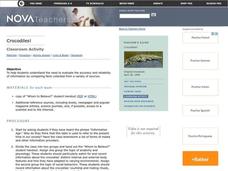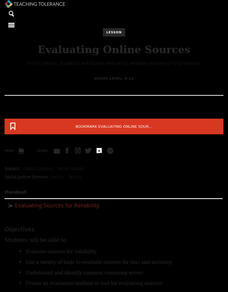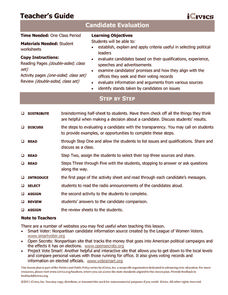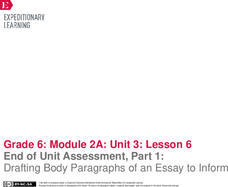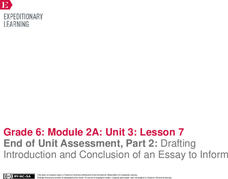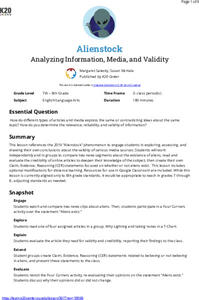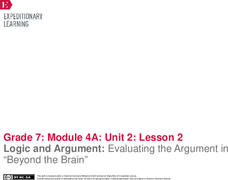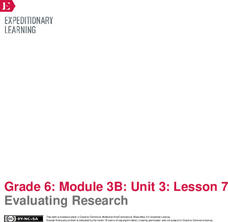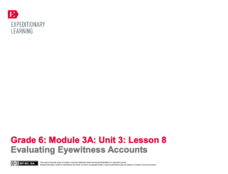University of Washington
Connecting Youth to Quality Health Information
Many teenagers don't have adequate access to health and nutrition information beyond a quick Internet search. Guide them into health advocacy and proficiency with a lesson focused on MedlinePlus as a reliable source for health...
California Department of Education
Evaluating Web Sites
If it's on the Internet, it must be true—right? How can someone tell if a website contains less-than-truthful information? Savvy surfers evaluate sources in the fifth of a six-part college and career readiness instructional activity...
Museum of the Moving Image
Evaluating Information: Focus on the 2008 Election
Just how true is the information contained in political ads? Determining the veracity of campaign ads from the 2008 presidential race is the focus of a instructional activity that introduces class members to several fact-checking resources.
Newseum
Covering a Catastrophe: Evaluating Disaster News
Young journalists investigate the various ways to share news about a disaster and evaluate the pros and cons of each of these types of news. Individuals then select two different forms of media reports of a recent disaster. Using the...
Southern Poverty Law Center
Evaluating Online Sources
All sources are pretty much the same, right? If this is how your class views the sources they use for writing or research projects, present them with a media literacy lesson on smart source evaluation. Groups examine several articles,...
Curated OER
Crocodiles
Work on research procedures in this lesson, which prompts writers to collect and evaluate information pooled from a number of sources. They work in teams to collect information about crocodiles from different sources. They compare the...
Ontario
Reading Informational Text
Learning to recognize the importance of the features of information text (i.e., titles, subtitles, endnotes, sidebars, etc.) is the focus of a reading activity designed for middle schoolers. Learners examine how these text features help...
EngageNY
Gathering Information about Screen Time: Assessing and Reading Internet Sources, Day 1
What's the best way to evaluate a source's accuracy and credibility? Pupils discuss the question with a partner and then share their ideas with the class. They also conduct Internet research, looking for an article that answers a chosen...
Teaching Tolerance
Evaluating Online Sources
Newspapers, television, social media ... how do people get their news? Using the informative resource, scholars locate and verify credible sources of information. Working in small groups, they discuss strategies for evaluating the...
Teaching Tolerance
Understanding and Evaluating Online Searches
With billions of options to choose from, how can people determine which online sources are reliable? Using an informative resource, pupils first discuss and evaluate a sample search result handout. Next, partners create a checklist for...
College Board
Evaluating Sources: How Credible Are They?
How can learners evaluate research sources for authority, accuracy, and credibility? By completing readings, discussions, and graphic organizers, scholars learn how to properly evaluate sources to find credible information. Additionally,...
Curated OER
Savvy Surfers: Website Evaluation and Media Literacy
Sixth graders strengthen their understanding of what a high quality website is composed of. Learners evaluate three websites for accuracy, credibility, and reliability by completing a chart.
iCivics
Candidate Evaluation
How can we decide between candidates on election day? After contemplating various issues and qualities, your learners will go through a step-by-step process of researching and evaluating sample candidates and determining their...
EngageNY
Performance Task Preparation: Peer Critique and Mini-Lesson Addressing Common Errors: Revising Draft Essay to Inform
Time to revise! Using a writing evaluation rubric, scholars participate in a peer editing process to provide feedback on each others' informative essays. Next, pupils begin revising their drafts based on the feedback they receive.
EngageNY
End of Unit Assessment, Part 1: Drafting Body Paragraphs of an Essay to Inform
Anybody can write a body paragraph! Pupils analyze the development of ideas in a body paragraph from a model essay. Next, using what they've learned, they draft the body paragraphs of their My Rule to Live By informative essay.
EngageNY
End of Unit Assessment, Part 2: Drafting Introduction and Conclusion of an Essay to Inform
A powerful introduction and conclusion can really pack a punch. Using the resource, scholars first read and discuss a model essay. Then, as part of the end of unit assessment, they draft the introductory and concluding paragraphs of...
K20 LEARN
Alienstock: Analyzing Information, Media, And Validity
One only has to watch MSMBC and FOX News to realize that media can present the same story in very different ways. Middle schoolers have an opportunity to test their ability to determine the validity and trustworthiness of information by...
K20 LEARN
Street Cred: Evaluating Sources
A lesson on evaluating sources of information teaches scholars to "think twice" before using a source. Researchers examine a resource's home page, author, and sponsor, as well as the date published and the documentation provided.
EngageNY
Logic and Argument: Evaluating the Argument in “Beyond the Brain”
The brain is not the mind. Scholars explore the claim by reading an informational article about neuroscience research, "Beyond the Brain." As they read, they answer text-dependent questions and complete an anchor chart to evaluate...
EngageNY
Evaluating an Argument: “Is Google Making Us Stupid?”
Does the Internet negatively affect peoples' brains? Scholars complete a Tracing an Argument note catcher to evaluate the question as they read the text "Is Google Making Us Stupid?" Exploring both sides of the issue, they add their...
EngageNY
Evaluating Research
Calling all archaeologists! Scholars dig through their research about overfishing, searching for the best information to include in their consumer guides. Next, pupils engage in a pair-share activity to discuss their findings with a...
English Enhanced Scope and Sequence
Differentiate between Formal and Informal Language
The Pledge of Allegiance, the Gettysburg Address, the National Anthem, and the Preamble to the Constitution all get close attention in an exercise that asks learners to rewrite these formally-worded documents into informal language....
EngageNY
Evaluating Eyewitness Accounts
That sounds like a plan! Scholars complete the Newspaper Article Planning graphic organizer to understand the process of writing a newspaper article. They also use what they learned about researching factual information and gathering...
Curated OER
Can Scientists Discover a Limit to Discovery?
Is there anything left to discover? Evaluate opposing sides of the debate regarding whether or not there is a future for scientific discovery. Middle and high schoolers assess quotations from the articles included to evaluate claims and...







